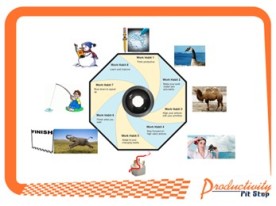I am so glad that I met Kevin Horsley, international grandmaster of memory and author of Unlimited Memory: How to Use Advanced Learning Strategies to Learn Faster, Remember More and be More Productive, a few years ago and that we could catch up over a cup of coffee on Friday.
I mentioned our new “8 Basic Work Habits That Will Skyrocket Productivity” workshop to him. He asked me what the habits were and I named them. “That’s only seven”, Kevin said when I was “finished”. I forgot “Finish what you start”!
In the next 5 minutes he helped me to use a method (“number-shape pegs”) to remember the habits very easily by associating information I already know well (the numbers 1 to 8) with new things I want to remember, e.g. the names of the habits by associating it with the numbers using a very vivid picture of what the number represents.
Check it out below.
| Number (of habit) | Shape | See the shape as vividly as possible (weird and wacky imagery allowed!) | Description of habit |
| 1 | Pencil | Pencil writing in a brain | Think Productive |
| 2 | Swan | Swan on misty lake, wearing glasses with wipers so it can see clearly | Clarity: Make your work visible and actionable |
| 3 | Camel (Two humps on its back in the shape of a 3) | Camel walking on a red line | Alignment: All actions must be aligned with one’s priorities |
| 4 | Boat sail | People on a boat all looking at a whale while all the time focusing their binoculars | Focus: Stay focused on the task at hand and avoid distractions and interruptions |
| 5 | Snake | Snake sliding through an electric adaptor plug | Adapt when priorities change |
| 6 | Elephant (with trunk above its head) | Elephant storming through the finish line | Completion: Finish what you start |
| 7 | Fishing rod and line | Lazy guy relaxes and takes time out fishing and just very slowly reels in the catch | Slow down to speed up |
| 8 | Snowman | Snowman reading a book | Learn and improve |
This method is particularly useful to remember lists of things, and here is how I will use it to help people in our workshops remember the 8 basic work habits very easily:
Here are the associations (pardon my handwriting!):
Thanks, Kevin! Oops, what is habit 6 again…ah, the elephant finishing!
If you have to/want to remember any list, try this method – it works.
Quote: “Happiness is nothing more than good health and a bad memory.” – Albert Schweitzer
What’s happening: “Productivity Breakthrough: 8 Basic Work Habits That Will Skyrocket Your Productivity” public workshops for Outlook users in Bloemfontein (7 October), Johannesburg (14 October, 8 December), Durban (4 November), Upington (11 November) Cape Town (18 November), or invite us in-house.
Remember to have fun this week!


